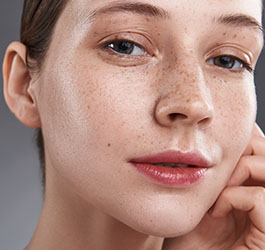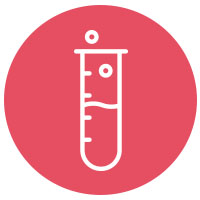Ingredient Spotlight: Collagen & Collagen Supplements

Steps inside any beauty store (virtual or physical) and you’ll notice that on the skincare shelves one word reigns supreme: collagen. Whether it’s a collagen serum or cream, a collagen booster or matrix, or even a collagen drink – it’s everywhere.
And with good reason. Maintaining and supporting collagen in our skin is a vital way to keep skin healthy, and there’s significant evidence that strong, abundant skin collagen makes the signs of ageing less noticeable.
But not everything is as it seems when it comes to collagen in beauty products. Before you dive into its potential, understanding exactly what collagen is, what it does and how it is related to skin ageing is key.

What is collagen?
Collagen is a protein found throughout the body that helps to provide structure to tissues such as bone and skin. Found in the extracellular matrix, which fills the gaps between cells, collagen acts as a scaffolding and is mostly present in muscles, tendons and in our skin.
Collagen has some pretty impressive properties: it is used frequently in advanced wound healing therapies to rebuild tissue, and gram for gram, studies show that some collagen is stronger than steel.
As the most abundant protein in our bodies, collagen makes up between 25% and 35% of all our protein matter. It is made, or synthesised, within the body rather than being ingested and each collagen molecule is comprised of a series of amino acids that are joined together.
While we often talk about collagen as one substance, there are actually around 40 proteins that form part of the collagen family – each performing a different role. Four types of collagen make up 90% of all the collagen found in the body:
Type 1: The most abundant collagen in the body, this densely packed collagen is found in high concentrations in bones, tendons and skin.
Type 2: Found mainly in cartilage, type two collagen is looser and more elastic than type one. It helps to cushion joints in the body.
Type 3: Thin fibres of this collagen help to form the structure of our muscles and organs – including the heart.
Type 4: This helps to form the “basement membrane”, a layer that provides tissue support and helps in filtration. It is found in high levels in the skin.

What does collagen do in the skin?
Collagen is found in the dermis of the skin – the middle layer – where it plays its vital role in providing structure and elasticity. Collagen molecules connect to each other, and bind with other molecules, such as elastin, to create the scaffolding or foundation for skin – providing support, structure and texture.
The firm, lifted or tighter look characteristic of younger skin is thanks to abundant, healthy collagen in the skin providing a strong scaffolding to maintain structure.
Collagen is produced in the skin by a cells known as a fibroblasts, which are the most common cell in our connective tissue (found throughout the body including in tendons, ligaments, blood and bone). In addition to collagen, fibroblasts also produce elastin and Glycosaminoglycans (GAGs), a group of substances including hyaluronic acid [ See our article on hyaluronic acid ].
Alongside its structural roles, collagen also helps with cell turnover and renewal – another factor that keeps skin looking fresh and healthy.

Why is collagen linked to ageing?
As we age, the body begins to lose its collagen, and production slows down dramatically. It’s thought that we lose 1% of our total collagen a year after the age of 20 – meaning that skin gradually appears thinner, less supple and the structure is compromised.
When the collagen scaffolding in the skin begins to break down – fine lines and wrinkles begin to appear. Over time, dwindling levels of collagen in the skin lead to deep wrinkles, dull skin, uneven skin tone and thinning.
Age is not the only factor that causes a decline in collagen levels, and environmental factors including UV exposure and diet can also contribute to falling levels in our skin.
Unprotected sun exposure is particularly damaging for collagen. One of the ways that UVA rays damage the skin is by damaging the collagen fibres in the dermis. Over time, this damage accumulates and can prematurely age the skin.
High sugar diets can also be damaging for skin’s collagen. This is in part due to a process called glycation. This occurs when a sugar molecule binds a protein molecule (such as collagen), disrupting its regular structure. As more of these appear in the skin, it distorts the skin overall texture, leading to fine lines and wrinkles.

Can we restore collagen?
Unlike some ingredients, adding collagen on to our skin topically or taking more into our bodies through collagen supplements or the diet will not increase the collagen levels in our skin. Large collagen molecules are too big to penetrate through the skin’s barrier in topical creams, and the benefits of orally taken collagen are hotly debated. Very few independent studies exist showing their efficacy, and there is little evidence that collagen can survive the digestion process or make its way to skin.
But all is not lost. Instead, we can encourage the skin to create its own collagen. Targeted ingredients and nutrients can support the skin to encourage normal, healthy collagen synthesis* and can protect the collagen that already exists in our skin.

What ingredients support collagen?
Vitamin A: Research has shown that Vitamin A in the skin helps to support collagen production. [1] It also can reduce the expression of matrix metalloproteinase (MMP) – molecules which are known to degrade collagen in the skin.
Vitamin C: Among its cascade of skin benefits [ See our article on vitamin C ] Vitamin C is a co-factor in the synthesis of collagen. This means it must be present in the body for strong collagen structures to be produced.
Superoxide Dismutase: An enzyme that is found in all living cells, superoxide dismutase (or SOD) can be derived from melons, and speeds up chemical reactions in cells. Emerging research shows that superoxide dismutase helps to prevent skin ageing by supporting collagen production. [2]
MSM: Found in coffee, tea, apples and tomatoes, MSM is a form of sulphur that has been shown to maintain collagen production in the skin. In addition, it also promotes the production of hyaluronic acid – adding further to its anti-ageing potential.

How to protect your collagen?
Sun protection, and protection from UVA and UVB rays is a skin health necessity. Alongside its other important benefits, protecting the skin from UV damage can help maintain healthy collagen in the skin.
A balanced and nutritious diet can also support skin. By eating a broad variety of high quality protein, vegetables and fruits, you can help your body get the nutrients it needs to synthesise collagen effectively. Additionally, moderation when it comes to sugar can help to avoid glycation (a form of collagen degradation) in the skin. And of course, taking a supporting collagen supplement like Skin Collagen Synergy.
[1] Varani, J et al. “Vitamin A antagonizes decreased cell growth and elevated collagen-degrading matrix metalloproteinases and stimulates collagen accumulation in naturally aged human skin.” The Journal of investigative dermatology vol. 114,3 (2000): 480-6. doi:10.1046/j.1523-1747.2000.00902.x
[2] Min Jung Lee, Gaurav Agrahari, Hae-Young Kim, Eun-Joo An, Kyung-Hee Chun, Hyeokgu Kang, Yeon-Soo Kim, Chul Whan Bang, Lee-Jung Tak, Tae-Yoon Kim, Extracellular superoxide dismutase prevents skin aging by promoting collagen production via activation of AMPK and Nrf2/HO-1 cascades, Journal of Investigative Dermatology, 2021,https://doi.org/10.1016/j.jid.2021.02.757.
*Vitamin C contributes to normal collagen formation for the normal function of skin.
